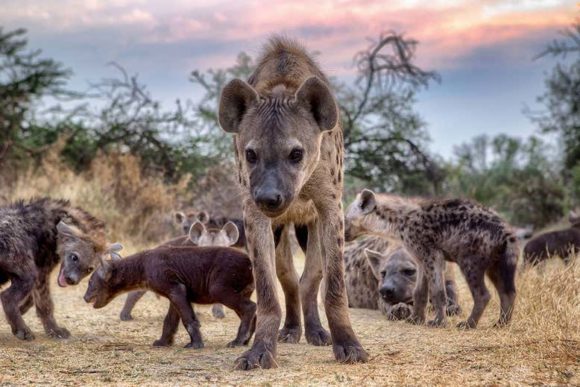Reading Wildhood by Barbara Natterson-Horowitz and Kathryn Bowers for New Scientist, 18 March 2020
A king penguin raised on Georgia Island, off the coast of Antarctica. A European wolf. A spotted hyena in the Ngorongoro crater in Tanzania. A north Atlantic humpback whale born near the Dominican Republic. What could these four animals have in common?
What if they were all experiencing the same life event? After all, all animals are born, and all of them die. We’re all hungry sometimes, for food, or a mate.
How far can we push this idea? Do non-human animals have mid-life crises, for example? (Don’t mock; there’s evidence that some primates experience the same happiness curves through their life-course as humans do.)
Barbara Natterson-Horowitz, an evolutionary biologist, and Kathryn Bowers, an animal behaviorist, have for some years been devising and teaching courses at Harvard and the University of California at Los Angeles, looking for “horizontal identities” across species boundaries.
The term comes from Andrew Solomon’s 2014 book Far from the Tree, which contrasts vertical identities (between you and your parents and grandparents, say) with horizontal identities, which are “those among peers with whom you share similar attributes but no family ties”. The authors of Wildhood have expanded Solomon’s concept to include other species; “we suggest that adolescents share a horizontal identity,” they write: “temporary membership in a planet-wide tribe of adolescents.”
The heroes of Wildhood — Ursula the penguin, Shrink the hyena, Salt the whale and Slavc the wolf are all, (loosely speaking) “teens”, and like teens everywhere, they have several mountains to climb at once. They must learn how to stay safe, how to navigate social hierarchies, how to communicate sexually, and how to care for themselves. They need to become experienced, and for that, they need to have experiences.
Well into the 1980s, researchers were discouraged from discussing the mental lives of animals. The change in scientific culture came largely thanks to the video camera. Suddenly it was possible for behavioral scientists to observe, not just closely, but repeatedly, and in slow motion. Soon discoveries arose that could not possibly have been arrived at with the naked eye alone. An animal’s supposedly rote, mechanical behaviours turned out to be the product of learning, experiment, and experience. Stereotyped calls and gestures were unpacked to reveal, not language in the human sense, but languages nonetheless, and many were of dizzying complexity. Animals that we thought were driven by instinct (a word you’ll never even hear used these days), turned out to be lively, engaged, conscious beings, scrabbling for purchase in a confusing and unpredictable world.
The four tales that make up the bulk of Wildhood are more than “Just So” stories. “Every detail,” the authors explain, “is based on and validated by data from GPS satellite or radio collar studies, peer-reviewed scientific literature, published reports and interviews with the investigators involved”.
In addition, each offers a different angle on a wealth of material about animal behaviour. Examples of animal friendship, bullying, nepotism, exploitation and even property inheritance arrive in such numbers and at such a level of detail, it takes an ordinary, baggy human word like “friendship” or “bullying” to contain them.
“Level playing fields don’t exist in nature”, the authors assert, and this is an important point, given the book’s central claim that by understanding the “wildhoods” of other animals, we can develop better approaches “for compassionately and skillfully guiding human adolescents toward adulthood.”
The point is not to use non-human behaviour as an excuse for human misbehaviour. Lots of animals kill and exploit each other, but that shouldn’t make exploitation or murder acceptable. The point is to know which battles to pick. Making young school playtimes boring by quashing the least sign of competitiveness makes little sense, given the amount of biological machinery dedicated to judging and ranking in every animal species from humans to lobsters. On the other hand, every young animal, when it returns to its parents, gets a well-earned break from the “playground” — but young humans don’t. They’re now tied 24-7 to social media that prolongue, exaggerate and exacerbate the ranking process. Is the rise in mental health problems among the affluent young triggered by this added stress?
These are speculations and discussions for another book, for which Wildhood may prove a necessary and charming foundation. Introduced in the first couple of pages to California sea otters, swimming up to sharks one moment then fleeing from a plastic boat the next, the reader can’t help but recognise, in the animals’ overly bold and overly cautious behaviour, the gawkiness and tremor of their own adolescence.


